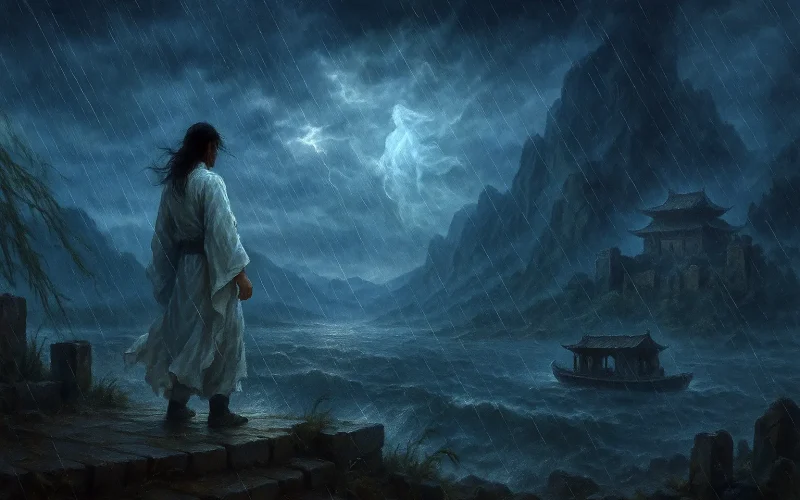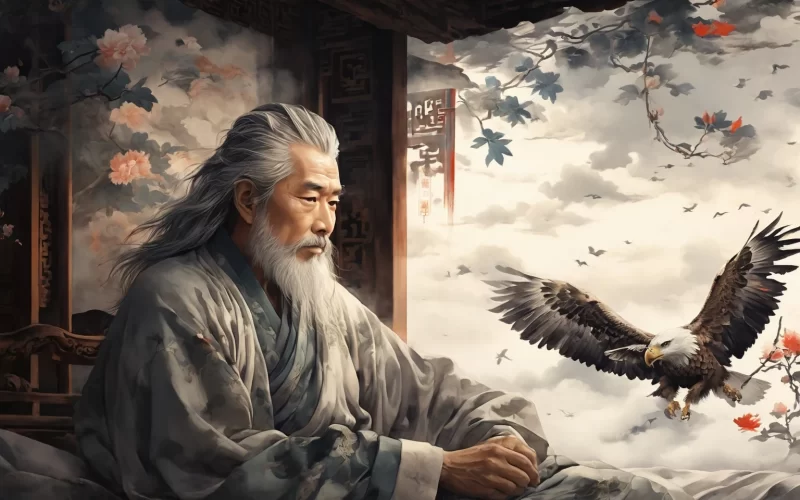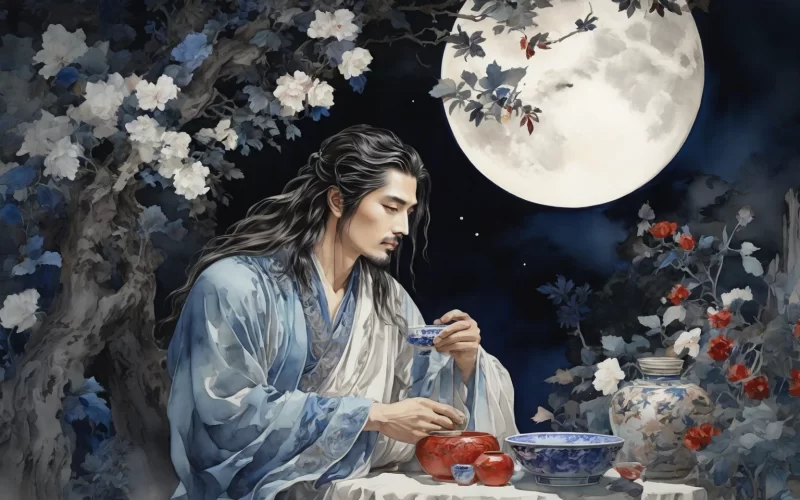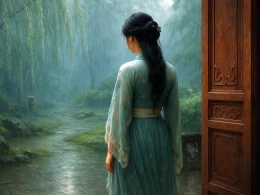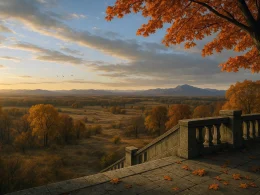I walk by the Wu Mountain isle,
Seek to climb the ancient Sunny Terrace.
The sky is vast, the colored clouds vanish;
The earth is distant, a clear breeze comes.
The Goddess left, long, long ago;
Where is the King of Xiang now?
Lust and excess ultimately led to ruin and replacement;
Only woodcutters and herdsmen are left to grieve in vain.
Original Poem
「古风 · 我行巫山渚」
我行巫山渚,寻登古阳台。
天空彩云灭,地远清风来。
神女去已久,襄王安在哉!
荒淫竟沦替,樵牧徒悲哀。
Interpretation
Composed during the late reign of Emperor Xuanzong, this poem employs the legendary encounter between the Goddess of Witch Mountain and King Xiang of Chu to critique contemporary imperial indulgence. Drawing from Song Yu's "Rhapsody of Gaotang" and "Rhapsody of the Goddess" (Warring States period), which describe the king's dream rendezvous with the divine maiden, Li Bai visits the ancient balcony at Witch Mountain to lament past extravagance while subtly condemning Xuanzong's obsession with Yang Guifei—a indulgence that weakened the state and precipitated the An Lushan Rebellion.
First Couplet: "我行巫山渚,寻登古阳台。"
Wǒ xíng Wūshān zhǔ, xún dēng gǔ yángtái.
I wander to the isles of Witch Mountain, Seeking to climb the ancient sunlit terrace.
The couplet opens with deliberate simplicity, yet conceals profound intent. "Wandering to the isles" marks physical arrival, while "seeking to climb" signifies a conscious spiritual pursuit. Witch Mountain and its terrace, immortalized in Song Yu's rhapsodies, had become cultural symbols of romantic illusion and disillusion. Li Bai's journey transcends mere sightseeing—it is a ritualistic dialogue with history, establishing the poem's tone of reflecting on the past to lament the present, and foreshadowing the ensuing expression of national concern and existential despair.
Second Couplet: "天空彩云灭,地远清风来。"
Tiānkōng cǎiyún miè, dì yuǎn qīngfēng lái.
Colored clouds vanish from the sky; From distant lands, a clear breeze arrives.
This couplet marks a pivotal transition in tone and imagery, creating a striking contrast between past and present. The "colored clouds" function as the poetic centerpiece—simultaneously a tangible visual element and a embodiment of the goddess who "appeared as morning clouds and dusk rain," representing all magnificence, dreams, and beauty. Their "vanishing" carries a cold, cruel finality, declaring the end of all illusion. Subsequently, the "clear breeze" emerges, sweeping away the glamour and introducing both sobering reality and profound emptiness. This progression from "vanishing" to "arrival" reflects not merely a shift in scenery, but the psyche's descent from historical reverie to harsh reality, thereby preparing the ground for the direct lament that follows.
Third Couplet: "神女去已久,襄王安在哉!"
Shénnǚ qù yǐ jiǔ, Xiāng wáng ān zài zāi!
The goddess left long ago; Where now is King Xiang?
At this juncture, the poet's emotions surge forth, confronting history through two potent rhetorical questions. "The goddess departed long ago" affirms the hollow nature of the myth, while "Where is King Xiang now?" directs the critique squarely toward temporal authority. The once seemingly invincible ruler, much like the captivating legend, has been entirely consumed by the relentless flow of time. These interrogations transcend mere nostalgic reflection; they embody a pointed critique and a stark warning for the ruling powers of the poet's own era—highlighting the stark parallels between King Xiang of old and Emperor Xuanzong, who was equally engrossed in the beauty of Lady Yang and his life of revelry, prompting reflection on what fate such a path presages.
Fourth Couplet: "荒淫竟沦替,樵牧徒悲哀。"
Huāngyín jìng lún tì, qiáo mù tú bēi'āi.
Indulgence leads to dynasty's fall; Woodcutters and herders lament in vain.
The concluding couplet delivers the poet's historical verdict through incisive diction and profound conception. The terms "indulgence" and "dynasty's fall" establish a clear causal relationship, revealing what Li Bai perceived as the fundamental pattern of imperial decline—this serves as a direct response to the implications raised in the previous couplet. The image of "woodcutters and herders lamenting in vain" resonates deeply: these common people, as the ultimate bearers of history's transformations, express genuine grief, yet the phrase "in vain" underscores their powerlessness. Such sorrow can neither alter the course of history nor awaken rulers intoxicated by pleasure, remaining merely as an enduring sigh for future generations. This conclusion adds a layer of unflinching critique to the poem's underlying compassion.
Holistic Appreciation
Using his visit to Witch Mountain and lament for the past as a starting point, this poem employs the goddess legend to satirize reality, expressing concern over imperial indulgence damaging the state. Moving from scene to emotion, the poet first describes his ascent to the ancient terrace and his reflections, then uses the disappearance of the goddess and King Xiang to critique royal excess, finally stating plainly that after the monarch's downfall, the people's grief is futile. The poem's meaning runs deep, alluding not only to Xuanzong and Yang Guifei's dissipation but also exposing the cyclical fate of dynasties collapsing due to negligent rule.
Artistic Merits
- Using the Past to Satirize the Present, Profound Meaning: The poet parallels King Xiang's indulgence with Xuanzong's pleasure-seeking, creating rich satirical nuance.
- Rhetorical Questions Intensify Lament: "The goddess left long ago; Where now is King Xiang?" makes the emotion more vehement while deepening the sense of historical rise and fall.
- Blending Reality and Symbolism: "Colored clouds vanish" symbolizes shattered dreams; "clear breeze arrives" represents harsh reality—the contrast deepens the poetic philosophy.
- Concise Diction, Desolate Style: The verses are brief yet filled with historical vicissitude, particularly the concluding image of commoners' vain lament, which heightens realism and tragedy.
Insights
Through historical allusion, this poem warns that imperial indulgence and neglect inevitably lead to national decline. By satirizing Xuanzong via the goddess legend, Li Bai issues a profound caution against rulerly excess. Historical rise and fall is not accidental but traceable—the poet uses the past to mirror the present, urging later generations to take heed. This serves not only as a warning to feudal rulers but also prompts broader reflection: pleasure-seeking ultimately faces historical judgment, while true longevity lies in diligent governance and people-centered rule.
About the poet

Li Bai (李白), 701 - 762 A.D., whose ancestral home was in Gansu, was preceded by Li Guang, a general of the Han Dynasty. Tang poetry is one of the brightest constellations in the history of Chinese literature, and one of the brightest stars is Li Bai.






